He has been working with the man who now serves as president for over two years. He says after getting to know each other, they quickly agreed that Peronist unity was essential in order to beat Cambiemos. “We both arrived with scars," he explains.
Santiago Cafiero, President Alberto Fernández’s right-hand man, sketches the logic of governance as a social democratic Peronism which enjoys a tradition within his own family.
Argentina’s Cabinet chief vows that Frente de Todos will not break up despite the crisis. He speaks harshly against the Mauricio Macri administration, with a passion which seems to contradict his own narrative of favouring dialogue, a mantra which he never stops repeating.
Is the Peronism of Buenos Aires City or San Isidro, where you live, different from the rest of the country?
There is just one Peronism, with a single baggage of theory and doctrine expressing values very much based on its identity throughout its history. Like all processes Peronism has a history of some triumphs and many defeats. It has elements which fill us with pride and others which reflect their epoch in history, being hard for us to see and interpret. But there’s just one Peronism.
But then, of course, there are also the Peronists, men and women with a track record whose commitment to public affairs began via Peronism. That’s where the shades of difference start creeping in, regarding life stories and track records. That’s also where you have a certain access to generating public policy in the neighbourhood of your militancy.
Then there are comrades like ourselves, the so-called “landless,” coming from places where Peronism has never set foot or has not done so in many years.
Parties with so many years of history consist of different geological layers. You must have diversity within the harmony. Success tends to place us within a comfort zone and Peronism is accustomed to winning.
Peronism went adapting itself to its time frames, to the currents of thinking then in vogue in global debate. The Peronism of 1946 did not have much in common with that of 1973 and yet Juan Perón was the leader of both.
Different expressions which entered into tension.
Of course. But the Perón of 1946 was a different person in a different Argentina and world. In 1973 he appealed for national unity with other ideas as to the construction of democratic foundations and the generation of long-term agreements. That perhaps did not exist beforehand. During the 18 years it was banned, Peronism was defeated all the time simply by virtue of being prohibited. Those were 18 years of resistance and after that Peronists were jailed, killed or went missing during the dictatorship until the return of democracy.
These are adaptations which have to do with the tools for developing political construction and consensus, basically tools which interpret what is happening.
Peronism is never out of gear and that also makes it durable while triggering much internal debate. Peronism has lost elections, as in 1983. It’s accused of many things. One line of thinking accuses it of being a destabilising or anti-democratic force, but it is also the political movement which has suffered most. The anti-democratic and reactionary reflexes are primarily against the Peronist leadership and people, something frequent in Argentine history. The dictatorships were against the Peronist people, expanding afterwards against the rest of society. We were the targets of that hate. But whenever Peronism lost elections, it reflected and embarked on self-criticism of its manners and methods, even holding primaries to settle differences in internal stances. It is thus continuously reinterpreting its main mandate, which is expressing the popular will of the most disadvantaged sectors, the middle classes, the pyme small and medium-sized companies with a stake in national economic development.
Every time Peronism lost, there was self-criticism. Few Peronist branches have faced such uphill situations as in the City of Buenos Aires or the district of San Isidro. The populations of these two districts do not represent those majorities. Perhaps you established that bond so quickly with Alberto Fernández because you both shared that difficulty.
What brought us together in a solid relationship was the vocation to understand that Peronism must be united, banishing the phantoms of disunity. It was necessary to make a big effort, seeking unity in diversity while not suppressing any thinking.
That need stemmed from a defeat.
Peronism is always more broadminded in defeat, as are Mauricio Macri’s people. Now he talks and bonds with the Radicals when he publicly despised them while in government.
Success leads to arrogance.
It seems we learned. This is a process of unifying Peronism and its leadership on the basis of that diversity. There are elements which were not there before and which are necessary today for a society which is also diverse.
Robert Nozick, that masterful moral philosopher, said that “wealth is diversity in harmony.” Alberto Fernández is accused of representing some values at one stage and others at another. What is Peronism according to Alberto Fernández?
Alberto’s leadership is consensual. What is consensual leadership? It’s not imposing ideas but feeding on those of others and continuing with a fixed strategic horizon, taking note of the impressions, track records and experiences of every man and woman, not just Frente de Todos comrades or allies in the electoral front – it’s also broadening that electoral front into a political front which incorporates different voices and outlooks.
That unity in diversity is what makes us win elections and broadening that diversity of voices is what feeds this government. We’ve incorporated Radicals like Ricardo Alfonsín, who has ended up joining as ambassador to Spain.
Do you need more groups to pitch in to govern?
You have to broaden your base in order to govern. For example, Marco Lavagna was summoned to direct the INDEC statistics bureau from a different background with Federal Consensus. But it seems to me that yet more is needed. We should be incorporating civic as well as political expressions. It is very valuable at a time of so much anxiety to add the outlook of experts and epidemiologists. Nobody asks the most skilled experts where they come from when seating them at the table.
Could that be a metaphor for something which goes further?
It was something very important. It fed the decisions taken.
Could that announce the need for a panel of experts for other difficult situations such as the economy?
We work on a permanent basis with the Argentine Industrial Union [UIA in its Spanish acronym] and you get to know that they are not necessarily Frente de Todos voters. Nevertheless, we hold dialogue and try to set up panels. Some dissent is necessary – if there were none and everything was uniform, it would not be a democracy. The CGT and CTA labour umbrella groupings, with their diversities, were able to join. The panel against hunger brought together businessmen, trade unionists and social movements.
Some of the opposition have only electioneering in their heads. Their commitment is to next year’s elections, nothing else, and that is fuelled by grabbing the headlines. That opposition sees weakness in that form of leadership but this should be an opportunity to generate cross-party state policies. In four years the Macri administration did not invite the opposition caucuses even once whereas our president. Alberto Fernández, has already invited them three times. In the pandemic process, the decision-making has been with the governors and the Buenos Aires City Mayor. That seems to make so much sense that it bothers some of the political leadership and the business establishment.
Would you say the Peronism of Buenos Aires City is more progressive? Former vice-president Chacho Álvarez and your father Juan Pablo would be examples.
That was some time ago. Peronism feeds off different currents, some more progressive and others a bit more conservative – I wouldn’t say conservative from the standpoint of the conquest of rights but rather tradition. Each time we see a possibility of conquering new rights, Peronism tends to unite, independently of ideology.
Is that City Peronism a kind of ancestor of the present?
It was a Peronism with a strong commitment to human rights, the same Peronism which was sustained by Kirchnerism and which continued implementing cross-party state policies in the framework of human rights. They kept an eye out for the economy falling into foreign hands. In the 1990s it was a Peronism more ready to combat the neo-conservative advance and not just in the economy. That Peronism was reflected in many of the policies and conquests under Kirchnerism and perhaps it still is today. It’s a Peronism which believes in a stronger state so that it can look after people.
The word “progressive” transcends Peronism, it would include [Radical] Raúl Alfonsín and [socialist pioneer] Alicia Moreau de Justo, for example.
Progressiveness is a social phenomenon which seeks to conquer rights and dissolve inequalities. Peronism has turned many of those aspirations into reality.
Progressiveness also aspires to a certain form of development. In this same interview space the president defined himself as a “social democrat,” adding: “The Peronists are going to hate me.” Within that progressiveness is there also a social democracy aiming for a more republican Peronism?
We must avoid characterising Peronism based on European ideological premises, avoid terms like left, right, progressive, Christian Democrat, etc., which is not to understand it as a popular movement. Peronism embraces many of those questions. My issue with those who call themselves progressives only is that while they are holding a congress over the need for bridges and housing, Peronism goes and does it – that’s the difference. Peronism has carried out many of the promises and postures of progressives throughout its history.
It would be an executive progressiveness.
Yes, very good, I like that! From the viewpoint of the conquest of rights, Peronism was always progressive. But progressives often go round and round in circles with debates whereas Peronism is action. We’re a Peronist government doing things, despite the crisis of recession, the debt left by Macri and the pandemic.
In Argentina progressives are criticised for their speechifying attitudes but the social democrats in northern and western Europe are observed to be executive progressives. Does the new Peronism thus incorporate social democratic features, a line going back to your grandfather Antonio?
Institutional and republican conduct is demanded from us without foundation. In your newspaper it was written that if we won, there would be armed militias. Jaime Durán Barba wrote that. I’m frontal and I don’t beat around the bush. Durán Barba wrote that if we won, we’d arm militia like Hugo Chávez in Venezuela with a policy of militia and motorcycle thieves via Vatayón Militante. We knew how to lose elections, Cristina knew how to lose elections and nothing ever happened – the democratic system continued. We accepted the defeats and celebrated the victories but fundamentally we did not interrupt democracy acting the way it does. Of course we disputed because we have our own identity and because we believe in what we’re doing but at no time did we put a spanner in the works. It’s important to insist on that. In 2015 we lost the election by a point. If we were that gang of brigands as we are often portrayed, the result would have been different. We lost by a point and immediately recognised the defeat. As they could not get us on that one, they ended up nailing us over the banality of our supposedly being disrespectful of the institutions because we transferred power elsewhere. I’ll say this in our defence and also in defence of the previous government – we won the elections and, over and above an attempt to scare everybody with some newspaper articles, Argentine democracy knew how to resolve its differences democratically. And this was at a time of regional convulsion when there had been an institutional coup d’état in Bolivia.
Why did Alberto Fernández pick you, aged only 40, for the most important post after his own of the presidency? I ask myself if he found in you the continuity of what your grandfather represented – a Peronist renewal truncated by Carlos Menem.
Menem cut short Antonio’s presidential aspirations but the spirit of renewal continued. Many of those who came of age in that period ended up with high-level political responsibilities and of a high calibre. The spirit moves forward.
Alberto Fernández would be an heir of all that.
Kirchnerism was a very important player, coming at a time of huge political discredit when even those of us who were militants lacked legitimacy and when the citizenry was very dissatisfied with politicians.
From the time of Néstor but above all in Cristina’s government, the participation of youth was promoted and today many of them have great administrative responsibilities. And that’s Peronism too. Many leaders, men and women contributing, and that’s what keeps Peronism alive. Our president is probably summoning a new sector of youth and moving them with his attitudes also to see politics as a tool of transformation and not a discredited activity, something important for the quality of democracy and for Peronism. It means we’ll continue being part of the debate and that the pool is being renewed.
You could see yourself as a link in the chain starting with the foundation of Renewal Peronism by your grandfather and then your father’s resistance to Menem, and afterwards in Kirchnerism where you see many Frepaso ideas incorporated and even leaders.
Like dad.
He was a Buenos Aires provincial minister and ambassador to the Vatican. We know that the President does not like to speak of ‘Albertismo’ but we take the term as signifying a process of evolution within Peronism and of his capacity to re-invent himself continually.
It would be interesting to explain to readers, many of whom are not government fans, what Albertismo is, not in opposition to Kirchnerism but as evolution within the Peronist political system. What does “coming back better” mean to you?
For me the key is the idea of consensual leadership. The president permanently generates panels of opinion, debate and discussion.
But that’s more institutional and customary in developed democracies.
But for four years the dominant media identified the institutional with Juntos por el Cambio, yet they never proposed any such interchanges even once.
Is that semantically uncomfortable for you?
It’s misconceived. The Macri camp is a very reactionary [form of] political expression. It has nothing to do with liberty, nor valuing the republic, nor the institutions. They called themselves the defenders of the institutions and the republic, filling so many newspapers and opinion spaces with this that it seems essential to me to argue the point.
This year with the pandemic there have been more sessions in both Chambers than last year with Macri. So far this year 60 senior officials, mostly ministers, have accounted for themselves before the Chamber of Deputies and last year only one. We need to debate that idea of who’s institutional.
Debating ideas is what we’re doing. The question is whether Alberto Fernández did not come along to respond somehow to those who criticised Kirchnerism for being weak on the institutional side. A president who engages in dialogue and seeks consensus responds to the collective unconscious with his own model of the stablest and most developed democracies.
That’s what we’re constructing. We believe in the institutions, in the republican values. But you don’t declaim democracy, you practise it. We can testify that we are practising it.
We in the media find it plausible, I don’t know if as a self-evident truth, but there was something about Peronism which fed the idea that it had difficulties with the institutional aspects, something built up in the collective imagination. If I were a Peronist, I would take that and try to refute it.
That’s what I would do.
And that’s what we’re doing, exactly…
I try to counter that with information and with facts. If I counterpose that construction orbiting around Peronism as to its authoritarian and anti-institutional aspects with another construction in the same sense, the only thing I’m creating is dispute.
I prefer to speak of data and concrete facts. For example, Néstor Kirchner, Alberto Fernández and Cristina Fernández de Kirchner reduced the size of the Supreme Court, to which they invited Argentina’s most prestigious jurists without asking them about their political loyalties whereas Mauricio Macri, who designated two Supreme Court justices by decree, is considered a lover of democratic institutions. That rattles me.
Did something happen to produce that construction?
The arena of that dispute is the media.
There are family sagas linked to politics, for example the Kennedy and then the Bush clans in the United States. What things did your grandfather and your old man tell you? Do you wonder some nights whether your grandfather would have done some things differently?
I’m very proud of my grandfather, of his achievements and also his defeats, what he learned from each defeat. I’m also very proud of my father – it was his destiny to fight against a worldwide wave which found its concrete expression with Carlos Menem in Argentina when neo-conservatism was in fashion. He was almost an alien against that trend.
I’m very proud that both had such strong convictions. My uncle Mario also had a distinguished political career but the analysis should not remain incomplete – we should also count the losses. My grandfather lost many more elections than he won. Both the dictatorships of 1955 and 1976 sent him to jail. My grandfather was ambassador at the Vatican in 1976 at the time of the coup. He could have stayed abroad and yet he returned because my father and my uncles were Peronist Youth militants – he was more frightened for them than for himself. That act of love and commitment should be borne in mind.
Only recounting the wins presents a false opinion to society, even generating a halo of privilege where there is none. When he got out of jail in 1955, my grandfather drove a taxi. Peronism was banned. My grandfather was the son of a greengrocer before entering politics. He had to endure being banned and both friction and friendship with Perón.
Are there parallels with what happened between Cristina and Alberto?
Peronism evolves that way, mercifully, when people understand each other, meet each other and open up. That is the basis of Peronism – the capacity and possibility to open up between comrades to outline new objectives.
Raúl Alfonsín said that some defeats have more grandeur than some victories.
You can lose the elections but win the ideas.
Is that what happened to Renewal Peronism, somehow?
Politics is also debate, with other forces and also internally.
How has having that grandfather and your father to listen to from childhood changed you?
I come from a family with a very strong social commitment.
Your uncle formed part of your grandfather’s provincial government in its last two years, then he was a Peronist deputy and later for ARI headed by Elisa Carrió. Finally, he travelled to Iran and upon his return tried to argue that they were not responsible for blowing up the AMIA (Jewish community centre in 1994). What’s it like talking politics with him?
There were always different opinions. There were times in which my father was very distanced from my grandfather’s political opinions. There were always differences between the brothers yet they could debate and discuss. We never stopped getting together. Those spaces were necessary. The analysis would be incomplete without the women of the family, my grandmother among them.
Tell us about them.
They always had a very strong social commitment, which trickled down to my entire family. My grandmother Ana Goitía worked in prisons, in Olmos, and with the humblest classes. My mother, María Luisa Bianchi, was highly active in social policy.
So is that what led you to social activities in La Cava shantytown from adolescence?
I began my political participation in a La Cava canteen at the age of 15 with what are now called slum priests, Father Aníbal and Father Jorge at that time. My militancy began there in social work. It’s that inequality which draws you, destining people to different commitments. Some turn to politics, others to social work exclusively and others even to journalism.
How are next year’s elections shaping up in an economic context which won’t be great, even if it’s forecast that Argentina could grow four to five percent next year after falling 10 to 12 percent this? People will be worse-off than when Alberto Fernández took office.
I must say that I’m more hopeful than your numbers say. Argentina is already showing signs of heterogeneous recovery, some sectors yes and others no, but there are symptoms of economic activity picking up. I expect we’ll be much better-off next year.
Even growing seven percent, Argentina will still be worse-off than when Alberto took office.
Macri lost more jobs than Alberto if you compare the first four months of 2019 and 2020. But it’s not a question of statistics.
But real wages will be clearly less.
We are taking many measures to sustain the level of employment.
My question is about the objective scenario.
I imagine an Argentina in reconstruction. We have to rebuild Argentina. We were coming out of a crisis of recession, debt, unemployment and increased poverty left by Macri. To that crisis was added the global pandemia. The former was our heritage in Argentina, the product of a totally useless government. In the face of this, the state adopted a strategic political direction, advancing towards the redistribution of income while trying to defend jobs and family earnings. That is to be found in specific policies to boost different sectors. That’s why Argentina will grow next year, I don’t know whether at Chinese rates or not but Argentina will grow.
Perceptions are important when the time comes to vote.
There are always two aspects: the material or reality and the subjective, that narrative accompanying a political or cultural process. Macri was telling you that Argentina needed a cultural change.
The cultural battle.
Macri’s focus was on the cultural battle in Argentina, making an erroneous analysis of society in thinking that it was uniform. And that uniformity had to accept the moral standards required by Macri because if they did, they would be worthy of the promised land, which was a rain of investments and if not, they were part of a backward Argentina. That’s when the retroactive blame started. It was not enough with Kirchnerism, they wanted to turn democracy around from then on by ending 70 years of Peronism. Macri sought to blame Argentine society for his own failures. That’s not constructing a positive narrative. We’ve lost count of the number of times we stumbled although we learned every time we fell, but we can count the number of times we picked up because this country knows how to get back on its feet.
So Argentina has an epic resilience?
Yes, because we’re going to do ourselves proud. All of us, not just the government. Proud that we could work together, agreeing to modify our behavioral norms to fight a pandemic. The pandemic we’re enduring is not over yet. We are at risk but we Argentines are looking after ourselves while changing our ways of forming relationships.
Will the ruling coalition win in this context?
Frente de Todos, or whatever might be our label next year, has worked hard, risking its own health and that of their families. Of course some people oppose us. This government has been nine months in power, six of them amid a pandemic. The opposition hasn’t the faintest idea how to fight against coronavirus, they’re not proposing anything. They still have not managed to digest the election result of last October 27. Macri’s in Switzerland while we’re doing this interview and Alberto Fernández is fighting the pandemic. This week he teamed up with the therapists rolling up their sleeves and on the ground in the wards. Meanwhile Macri was globetrotting.
So Juntos por el Cambio being led by a captain with a negative image will benefit Frente de Todos?
That’s something Juntos por el Cambio needs to work out, I don’t know. What can be perceived is that there will be a big lead.
Bigger than in 2019?
Not the slightest doubt.
Would the ruling coalition’s candidate have to be the president running for re-election if he reaches 2023 in reasonable shape?
The people would have to define that but I think so. If that’s the context, if our administration is successful, yes. This success would normalise the economy and calm Argentina, advancing with a model of development on the basis of our pymes small and medium-sized companies creating jobs. If we can generate public policies such as urbanising our low-income neighbourhoods and developing a housing programme, I have no doubts.
There are those who think that Cristina will clash with Alberto Fernández. That oracle of Delphi Guillermo Moreno has said that this time Alberto Fernández would break up with her, how will the relationship continue?
As until now, with the vice-president and president highly complementary. She has an undeniable track record. The fact that they are complementary is what bothers some people because that’s what gives us the political muscle to advance. Do their opinions differ? Of course they do. They do not always think the same, something which happens all the way along our front. We have different outlooks on some issues but we always promote dialogue, debate and discussion. We always find that the objectives are more important and we keep advancing. In the Macri camp they are all plaintiffs in cases because they spy on one another. For some this does not matter and their political force is robust. But it does matter if Sergio Massa thinks one thing, Santiago Cafiero another and Máximo Kirchner something else and they express it.
To what do you attribute that?
Some of the opposition is seeking to break us up because when we split up, they won. They have no winning proposal of their own. They did not come to power telling Argentina what model of a country they wanted. Instead they lied to Argentina speaking of zero poverty. They did not keep any of their promises and it’s not just me saying that. Their victory was our defeat. In their four years they were not a government – they were the opposition to the opposition. And that cost them the government.



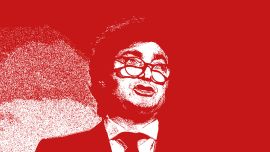


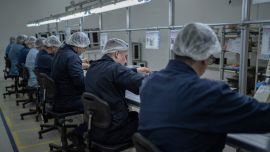
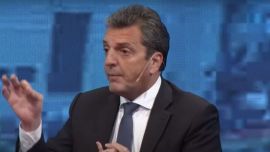



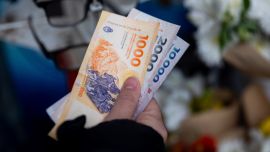


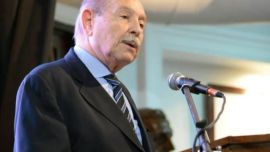




Comments